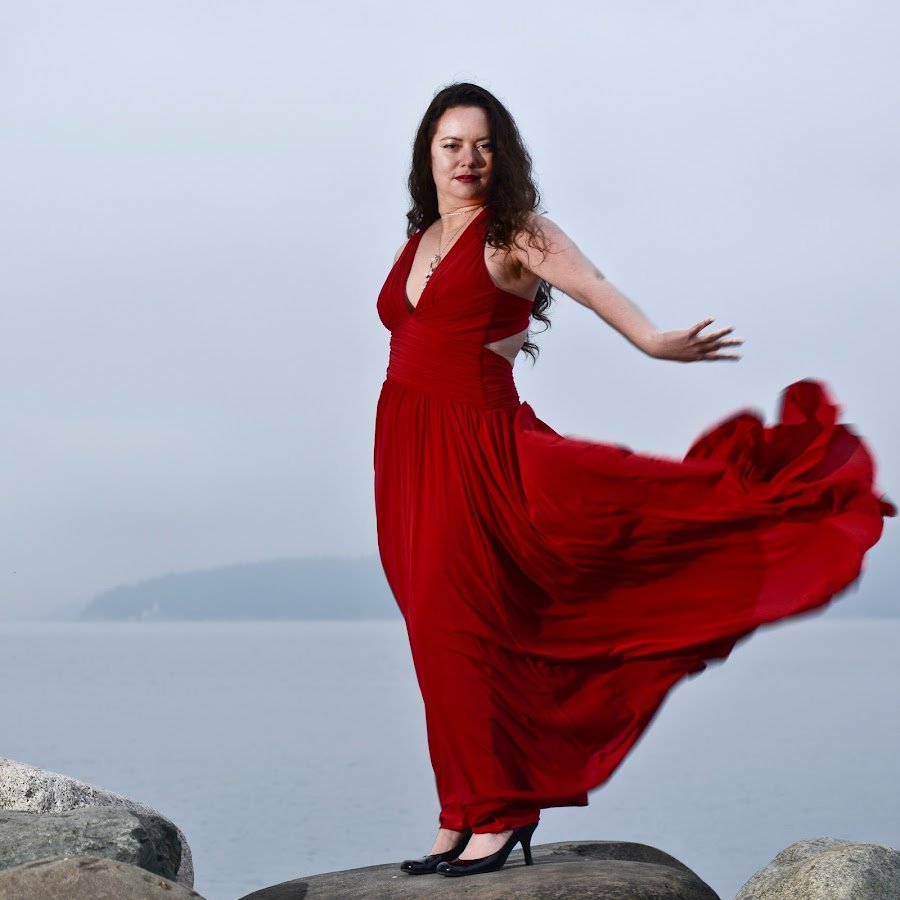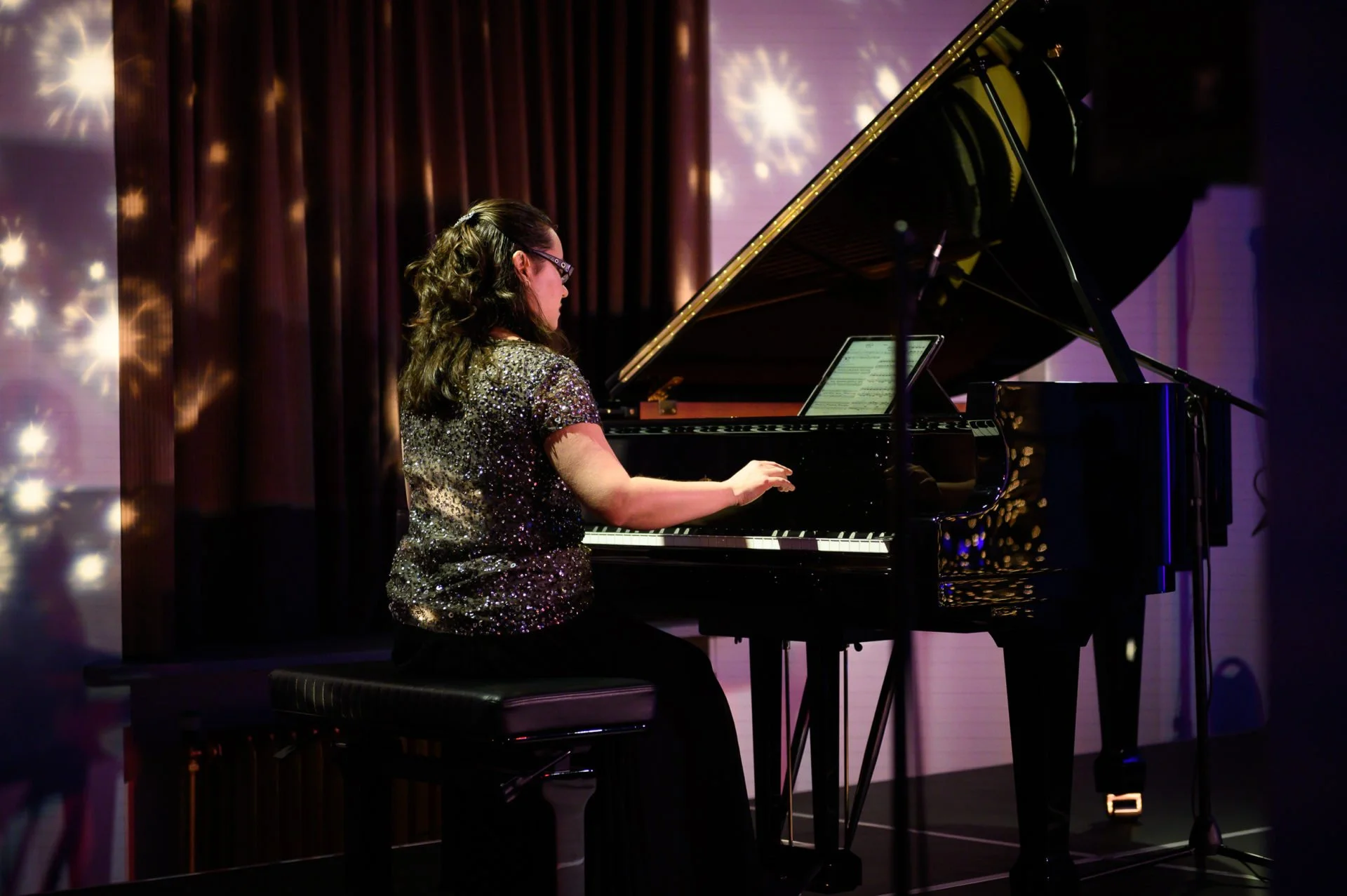Pianist Rachel Kiyo Iwaasa embraces the light and the dark for Music for the Winter Solstice
At contemplative Music on Main concert, the musician premieres new Rodney Sharman work dedicated to her late mother
Rachel Kiyo Iwaasa. Photo by S.D. Holman
Music on Main presents Music for the Winter Solstice at Heritage Hall on Wednesday and Thursday, December 14 and 15.
IT’S A DELICATE balance. Midwinter in the Pacific Northwest is undeniably cold and dark, and often very wet, too. For some of us, it’s a time to turn inward, to assess the year behind us and to plan for the future. For others, it’s all tinsel and baubles, a time to celebrate the birth of the western world’s reigning prophet and to gather friends and family together for the candlelight sacrifice of bird or pig. Christmas concerts are perhaps inherently festive in both tone and repertoire.
But what if you’re an event producer and want to honour the contemplative as well as the celebratory?
Well, you could do no better than look towards Music on Man’s annual Music for the Winter Solstice, now in its ninth year of providing winter warmth and uplift to an eager and cultured audience. MoM artistic director Dave Pay’s personal charm pervades the event, as does his intelligence: Music for the Winter Solstice usually involves some brand new music from acclaimed composers, some Johann Sebastian Bach, some tunes that split the difference between art song and pop, and a growing list of specially commissioned carols, including the now-traditional singalong finale of Pulitzer Prize–winner Caroline Shaw’s “Winter Carol”.
It’s the kind of concert you can enter with a case of the seasonal sads and leave feeling exalted, as pianist Rachel Kiyo Iwaasa readily agrees.
“The Solstice show is really special,” says the pianist, a fixture on the Heritage Hall stage since the event’s inception in 2013. “I’ve never experienced anything quite like it, where I’m seeing the same faces, the same audience. It’s become a real seasonal marker for me, but for quite a lot of other people, too. It’s a little bit like that family that you only see at Christmas time at the family gatherings, and it has the same kind of feel, but in a secular way, of marking the year.”
That’s definitely part of the event’s celebratory side. Music for the Winter Solstice is attended by an unusually high percentage of musicians and other arts professionals, and for many of us it’s like a reunion of our chosen family, whether or not we have other seasonal events or birth-family festivities to attend. There’s a palpable buzz in the room before the show, during intermission, and for some time after the final note has echoed away.
“It’s a real feel-good concert, and I say that as someone who is often not that interested in feel-good kind of things,” says Iwaasa, who allows that for her the Christmas season has been darkened by her father’s death, when she was only 13, on December 23. “After having been a child who loved Christmas more than anything else,” she says, “once my father died it really lost its appeal.”
The pianist apologizes for the dark turn our conversation has taken, but it’s appropriate. This season, she has been focussing on family and loss; she’s currently artist in residence at the University of Victoria as part of that institution’s Past Wrongs, Future Choices program, which examines the legacy of Japanese internment in Canada, the U.S.A., Brazil, and Australia during the Second World War. (Due to her father’s prescience, the Japanese-Canadian side of her family escaped internment, but its post–Pearl Harbour move from the West Coast to Alberta involved other losses and tragedies. Iwaasa is writing a text around those events, which will be set to music by Japanese-Canadian composer Leslie Uyeda.) And as part of her Music for the Winter Solstice program she’ll premiere a new work by Rodney Sharman, Known and Unknown, dedicated to and inspired by her late mother, Inger.
“Just before the pandemic, I was getting ready to record my next CD, which features Rodney Sharman’s solo piano music,” she explains. “So, as one does, I did a recital just before I was supposed to head to Banff at the end of March, 2020, and make my recording—which, of course, didn’t happen, although that recording has happened in another way, and will be coming out early in the new year. So I played this concert, and in the audience were the two men who run the McGrane Pearson Foundation. They were really taken by the concert as a whole, and also they’d known me and my mother for quite some time. They said they wanted there to be a piece to… commemorate wasn’t the word that they used, but they wanted a piece about me and my mother, because they felt that we had a very special relationship.
“You know, my mother attended every concert that I played until she couldn’t anymore,” Iwaasa adds. “My mother had dementia—well, she had Alzheimer’s—and ultimately lived with me for the last six years of her life as I cared for her and helped her navigate the challenges of that disease.”
The piece—which like much of Sharman’s piano music is both beautiful and mysterious, and which is based on the composer’s transcription of Bach’s Cantata No. 82—has taken on new layers of meaning since Inger Iwaasa’s death in June of 2020. That it will be premiered at Music for the Winter Solstice is also resonant.
“The last Solstice show that I played live, which was in 2019, was the first concert that my mother was unable to attend,” Iwaasa points out. “I remember standing up in front of the audience and talking about my mother and what a huge supporter she’d been and how this was a landmark. I dedicated the performance to her and the plan had been that she’d be there to hear that, but of course she couldn’t be. So I’m returning to Music on Main with a piece that’s about her.….And I know that there are a lot of people there who remember her and who’ll also have noted our relationship, much like Ken [Gracie] and Philip [Waddell] at the McGrane-Pearson Foundation did.”
Iwaasa is quick to point out that, in keeping with Music for the Winter Solstice’s ethos, the night will not only be about mourning, memory, and loss. She’s looking forward to sharing the stage with Chinese-Canadian pianist and songwriter Robyn Jacob, having recently seen and enjoyed Jacob’s music-theatre project with Nancy Tam, Double Happiness: Detour This Way. She’s enthusiastic about cellist Jonathan Lo’s interpretation of a Bach cello suite. And when Iwaasa performs a pair of Robert Schumann lieder with tenor Asitha Tennekoon, they’ll be giving listeners an initial taste of what seems sure to be an exciting new collaboration. Tennekoon and Iwaasa first worked together at Art Song Lab last summer, and their chemistry was immediate.
“We just clicked,” the pianist says. “It’s one of those rare chamber-music partnerships that, when it happens, you go ‘Okay, this is something rare and precious, and we have to find more places to play together.’”
There are new shoots already poking through the metaphorical snow, it seems, and a brighter, greener future is on the horizon.
“The darkness is hard, but one of the things the seasons teach us is that the light is coming again,” Iwaasa says. “Right? There is no spring without this die-off. There is no spring without this time of cold and of stopping and resting. So when we look at the bigger picture of mourning someone that we loved, that seasonal turn and that rotation around the sun can be a real solace.”















